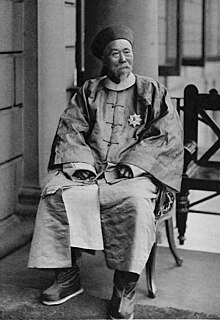
Back Li Hongzhang AST Лі Хунчжан Byelorussian Li Hongzhang Catalan Li Chung-čang Czech Li Hongzhang German Li Hongzhang Spanish لی هنگژانگ Persian Li Hongzhang Finnish Li Hongzhang French 李鴻章 GAN
Li Hongzhang | |
|---|---|
李鴻章 | |
 Li Hongzhang wearing the Breast Star of a Knight Grand Cross of the Royal Victorian Order, 1896 | |
| Grand Secretary of the Wenhua Hall | |
| In office January 9, 1875 – November 7, 1901 | |
| Grand Secretary of the Wuying Hall | |
| In office January 16, 1872 – January 9, 1875 | |
| Assistant Grand Secretary | |
| In office August 27, 1868 – June 22, 1872 | |
| Viceroy of Zhili and Beiyang Trade Minister | |
| In office July 8, 1900 – November 7, 1901 | |
| Preceded by | Yulu |
| Succeeded by | Yuan Shikai |
| In office August 29, 1870 – August 28, 1895 | |
| Preceded by | Zeng Guofan |
| Succeeded by | Wang Wenshao |
| Viceroy of Liangguang | |
| In office May 24, 1900 – July 9, 1900 | |
| Preceded by | Tan Zhonglin |
| Succeeded by | Tao Mo |
| Viceroy of Huguang | |
| In office February 2, 1867 – August 29, 1870 | |
| Preceded by | Guanwen |
| Succeeded by | Li Hanzhang |
| Viceroy of Liangjiang (acting) | |
| In office May 23, 1865 – October 27, 1866 | |
| Preceded by | Zeng Guofan |
| Succeeded by | Zeng Guofan |
| Personal details | |
| Born | February 15, 1823 Hefei, Qing Empire |
| Died | November 7, 1901 (aged 78) Beijing, Qing Empire |
| Spouse(s) | Lady Zhou Lady Xiaolian Lady Mo |
| Relations |
|
| Education | Jinshi degree in the Imperial Examination |
| Occupation | Official, general, diplomat |
| Awards | Order of the Double Dragon Knight Grand Cross of the Royal Victorian Order.[1] Grand Cross of the Order of the Red Eagle.[2] |
| Signature | |
| Military service | |
| Allegiance | |
| Branch/service | Qing Army |
| Rank | General |
| Commands | Beiyang Fleet Huai Army |
| Battles/wars | Taiping Rebellion First Sino-Japanese War |
| Li Hongzhang | |||||||||||||||
|---|---|---|---|---|---|---|---|---|---|---|---|---|---|---|---|
| Traditional Chinese | 李鴻章 | ||||||||||||||
| Simplified Chinese | 李鸿章 | ||||||||||||||
| |||||||||||||||




Li Hongzhang, Marquess Suyi (Chinese: 李鴻章; also Li Hung-chang; February 15, 1823 – November 7, 1901) was a Chinese statesman, general and diplomat of the late Qing dynasty. He quelled several major rebellions and served in important positions in the Qing imperial court, including the Viceroy of Zhili, Huguang and Liangguang.
Although he was best known in the West for his generally pro-modern stance and importance as a negotiator, Li antagonised the British with his support of Russia as a foil against Japanese expansionism in Manchuria and fell from favour with the Chinese after their defeat in the First Sino-Japanese War. His image in China remains controversial, with criticism on one hand for political and military defeats and praise on the other for his success against the Taiping Rebellion, his diplomatic skills defending Chinese interests in the era of unequal treaties, and his role pioneering China's industrial and military modernisation. He was presented the Royal Victorian Order by Queen Victoria. The French newspaper Le Siècle described him as "the yellow Bismarck."
- ^ Antony Best, "Race, Monarchy, and the Anglo-Japanese Alliance, 1902–1922,"Social Science Japan Journal 2006 9(2):171–186
- ^ Meng, Hong, Chinese in Germany at the end of the Qing-Dynasty, Page 3